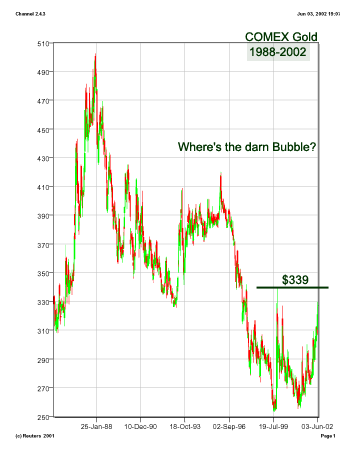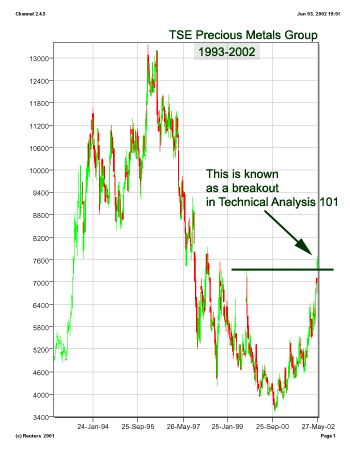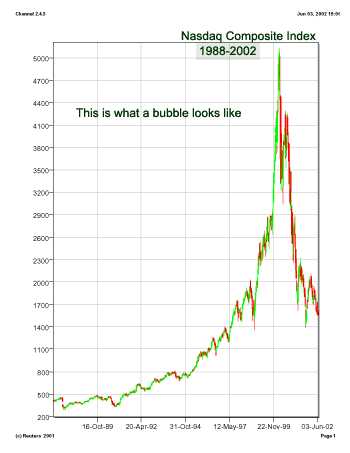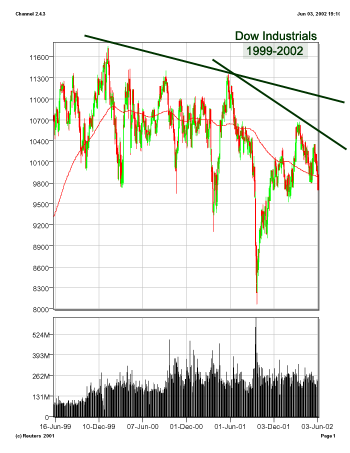|
Who didn't see that sell off in the
Dow Monday? Looks like we need a fresh scapegoat.
There'll be plenty scapegoats on
the way down. Speaking of down, the Wall Street Journal finally
broke the news. Their title was "No Safe Haven: Dollar's Slide
Reflects Wariness About U.S." I got the tip early Monday morning
and went out to buy a paper, marking the first time I've looked
at the WSJ since promising myself never to pick it up again, a little
over a year ago.
Now, the day they get the headline
right is the day they get my subscription. Before the bull market
in gold is over we predict they will. Thus, one day, not too long
into the future, the headline will read: Gold Is Money.
By then maybe our headline will be
the Gold Bubble!
Those clever analysts at Barclays
beat us to it though. They say there's a bubble in gold prices today.
So just to be thorough we went and looked at some graphs to get
a handle on this breaking news.
Were we ever let down. To think that
such a solid tip from as reputable a source as Barclays Capital
could turn out to be a lemon, well, we were in dismay to say the
least. They could use a good bubble analyst, preferably one that
has more than just a lamentable understanding of money. If one can't
tell the difference between what a bubble is and what it isn't,
how can they know what is safe?
Maybe it's because we've been showing
too many of those short-term charts lately, or maybe Barclays' charting
service doesn't have long-term graphs. I don't know, but someone
show me where there is a bubble in this market, please.

I couldn't find one. I tried until
my eyes squinted. All I could find is a little upturn at the end
of it all, so far. Did I miss a big move that hasn't been graphed
yet? But I didn't give up hope. I knew that Barclays would have
done its homework before throwing out a tip like that. So we looked
at the charts of some of the gold equities.

Look at that. Well, it could be a
bubble in the making, but so far, it's no bubble. It looks more
like a break out to me. I wonder what Barclays would call a break
out if not that? Normally, we wouldn't help out are competition,
but it seems to me that even if we did it wouldn't matter much,
and they sure could use it by our estimation.
So here it is. This is what a bubble
looks like fellas':

It's quite simple really if you got
hindsight. Even if we were wrong and gold prices went off to new
lows from here. Today's rally isn't a bubble. It's a rally. But
then, I guess the other side of this market's still in denial.
Maybe the rally in gold prices is
hurting the bankers a little. They've been promising to sell all
of their remaining bullion. Promises, promises. Wouldn't that be
fun?
Did you know that when bankers sell
their bullion, demand rises? Barclays doesn't. No, we won't pull
our punches. They think they know that when gold prices go up demand
falls. It would if the only thing gold was good for was jewelry.
But I guess they've never heard of investment demand, or understand
how the liquidity premium would work in the business of money. Very
different guys.
Did they help the WGC come up with
that Jewelry sales program?
Money has only one economic function.
It enables the free exchange of goods and services within a market
system. Where the dollar fails to do that, gold hasn't. For the
dollar is just a money substitute, at its best.
Wall Street largely fails to recognize
this still today. Money to the average person is something they
can use to pay bills with. Money to an economist is what consumers
hoard that they think will help them buy what they need in the future.
That process, where the consumer decides on which commodity (or
money substitute) to hoard, determines what every good and service
in any economy will ultimately be priced in, or exchanged for.
That process is always evolving and
policymakers are always trying to figure out how to get the market
to prefer dollars (or euros), naturally to gold.
When they fail, as inevitably they
must, gold prices rise, bankers whine, investors lose money (if
they're long too many overvalued sectors, which they invariably
are if gold prices are rising in the first place), inflation becomes
visible to the owners of dollars, and capitalism takes a step towards
purging itself of bureaucracy.
If Barclays doesn't improve its understanding
of monetary issues, markedly, it risks being the last to sell its
dollars.
The only reason to be bearish on
gold in our opinion is if the US dollar and US stock markets can
refute our bearish prognostication. Dollar bulls have a lot of work
to do.
 The
Nasdaq crumbled today, giving up all of early May's gains. The composite
closed at a new eight-month low, and just a hair above May's lowest
(intraday) trade. The bears are telegraphing a test of September's
low this week. The S&P 500 index went off to a bona fide fresh eight
month low, with the same intentions. There is no good support left
between Monday's close and 940, and we do expect a test of that
level, at a minimum. The
Nasdaq crumbled today, giving up all of early May's gains. The composite
closed at a new eight-month low, and just a hair above May's lowest
(intraday) trade. The bears are telegraphing a test of September's
low this week. The S&P 500 index went off to a bona fide fresh eight
month low, with the same intentions. There is no good support left
between Monday's close and 940, and we do expect a test of that
level, at a minimum.
The Dow Industrials fell through
the neckline of a three-month descending triangle (top) on the daily
chart, and bears are headed for January's low, or 9529. That low
is the last highest low in the intermediate bull market sequence
the DJIA has been trending in since 9-11.
The immediate technical objective
of the descending triangle formation is 9000, or 1000 points lower.
Our target for the Dow low this year is 6000, maybe 7000 if they
are lucky… the bulls that is.
Leading the Dow to September's lows
are the components already there or below it, such as GE, Microsoft,
IBM, SBC, AT&T, and Merck. Breaking down over the last few days
have been United Technologies, American Express, Citigroup, JP Morgan,
GE, Wal-Mart, Home Depot, Coke, Disney, General Motors, and Caterpillar.
The last four are still holding an intermediate bullish sequence,
but are telegraphing weakness, as is the rest of the market.
It looks ugly out there in New Economy
land! We are definitely sellers of most stocks.
Ed Bugos
All Charts are compliments of Bridge-Reuters
|

